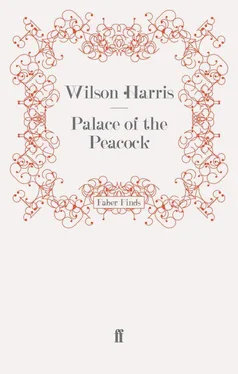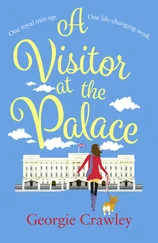Wilson Harris - Palace of the Peacock
Здесь есть возможность читать онлайн «Wilson Harris - Palace of the Peacock» весь текст электронной книги совершенно бесплатно (целиком полную версию без сокращений). В некоторых случаях можно слушать аудио, скачать через торрент в формате fb2 и присутствует краткое содержание. Год выпуска: 2013, Издательство: Faber Finds, Жанр: Современная проза, на английском языке. Описание произведения, (предисловие) а так же отзывы посетителей доступны на портале библиотеки ЛибКат.
- Название:Palace of the Peacock
- Автор:
- Издательство:Faber Finds
- Жанр:
- Год:2013
- ISBN:нет данных
- Рейтинг книги:5 / 5. Голосов: 1
-
Избранное:Добавить в избранное
- Отзывы:
-
Ваша оценка:
- 100
- 1
- 2
- 3
- 4
- 5
Palace of the Peacock: краткое содержание, описание и аннотация
Предлагаем к чтению аннотацию, описание, краткое содержание или предисловие (зависит от того, что написал сам автор книги «Palace of the Peacock»). Если вы не нашли необходимую информацию о книге — напишите в комментариях, мы постараемся отыскать её.
Palace of the Peacock — читать онлайн бесплатно полную книгу (весь текст) целиком
Ниже представлен текст книги, разбитый по страницам. Система сохранения места последней прочитанной страницы, позволяет с удобством читать онлайн бесплатно книгу «Palace of the Peacock», без необходимости каждый раз заново искать на чём Вы остановились. Поставьте закладку, и сможете в любой момент перейти на страницу, на которой закончили чтение.
Интервал:
Закладка:
The wind rushed down the cliff so strong he almost fell again but it turned and braced him at last and he continued ascending as a workman in the heart and on the face of construction. He fastened on this notion to keep his mind from slipping. The roaring water was a droning misty machine, and the hammer of the fall shook the earth with the misty blow of fate. A swallow flew and dashed through the veil and window. His eyes darted from his head and Donne saw a young carpenter in a room. A light shone from the roof and the curtains wreathed slowly. Donne tried to attract the young man’s attention but he did not hear and understand his summons. He hammered against the wall and shook the window loud. Everything quietly resisted. The young carpenter nevertheless turned his face to him at last and looked through him outside. His eyes were darker than the image of the sky and the swallow that had flown towards him was reflected in them as in window-panes of glass. Donne flattened himself against the wall until his nose had been planed down to his face. He wanted to see the carpenter closely and to draw his attention. He saw the chisel in his hand and the saw and hammer lying on the table while the ground was strewn with shavings resembling twigs and leaves. A rectangular face it was, chiselled and cut from the cedar of Lebanon. He was startled and frightened by the fleshless wood, the lips a breath apart full of grains from the skeleton of a leaf on the ground branching delicately and sensitively upward into the hair on his head that parted itself in the middle and fell on both sides of his face into a harvest. His fingers were of the same wood, the nails made of bark and ivory. Every movement and glance and expression was a chiselling touch, the divine alienation and translation of flesh and blood into everything and anything on earth. The chisel was old as life, old as a fingernail. The saw was the teeth of bone. Donne felt himself sliced with this skeleton-saw by the craftsman of God in the windowpane of his eye. The swallow flew in and out like a picture on the wall framed by the carpenter to breathe perfection.
He began hammering again louder than ever to draw the carpenter’s intimate attention. He had never felt before such terrible desire and frustration all mingled. He knew the chisel and the saw in the room had touched him and done something in the wind and the sun to make him anew. Fingernail and bone were secret panes of glass in the stone of blood through which spiritual eyes were being opened. He felt these implements of vision operating upon him, and still he had no hand to hold anything tangible and no voice loud enough to address anyone invisible. But the carpenter still stood plain before him in the room with the picture of the swallow on the wall perfectly visible amidst all and everything, and there was no earthly excuse why he could not reach him. He hammered again loud to attract his attention, the kind of attention and appreciation dead habit taught him to desire. The carpenter still looked through him as through the far-seeing image and constellation of his eye — clouds and star and sun on the windowpanes. He hammered again but nothing broke the distance between them. It was as if he looked into a long dead room in which the carpenter was sealed and immured for good. Time had no meaning. The room was as old as a cave and as new as a study. The walls — whether of glass or stone or wood — were thicker than the stratosphere. All sound had been barred and removed for ever, all communication, all persuasion, all intercourse. It was Death with capitals, and when he saw this he felt too that it was he who stood within the room and it was the carpenter who stood reflected without. This was a fantasy, this change of places, and he hammered again loud. The image of Death in the carpenter stared through him, the eyelids flickered with lightning at last in the midst of the waterfall. He raised his hammer and struck the blow that broke every spell. Donne quivered and shook like a dead branch whose roots were reset on their living edge.
The carpenter turned to another picture he had framed on the wall. An animal was bounding towards him through the prehistoric hole in the cliff Jennings had dreamed to find. It had a wound in its side from a spear and its great horns curved into a crescent moon as if the very spear had been turned and bent.
The animal was so lithe and swift one had no eye for anything else. It bounded and glanced everywhere, on the table, on the windowsill with the dying light of the sun, drawing itself together into a musing ball. It danced around the room swift as running light, impetuous as a dream. It was everywhere and nowhere, a picture of abandonment and air, a cat on crazy balls of feet. It was the universe whose light turned in the room to signal the approach of evening, painting the carpenter’s walls with shades from the sky — the most elaborate pictures and seasons he stored and framed and imagined. The room grew crowded with visions he planed and chiselled and nailed into his mind, golden sights, the richest impressions of eternity. It was a millionaire’s room — the carpenter’s. He touched the dying animal light at last as it ran past him and it turned its head around towards him, a little startled by his alien fingers and hand, remembering something forgotten. The alert dreaming skin — radiant with spiritual fear and ecstasy — quivered and vibrated like the strings of a harp where the mark of the old wound was and it tossed the memory of the spear on its head, trying to recall the miracle of substance and flesh. It stood thus — with the carpenter’s hand upon it — with a curious abstract and wooden memory of its life and its death. The sense of death was a wooden dream, a dream of music in the sculptured ballet of the leaves and the seasons, the shavings on the ground from the carpenter’s saw and chisel. His finger had touched an ancient spear point and branch and splinter and nail, whose nervous vibration summoned a furious portrait to be framed by the memory of creation. The windowpane clouded a little with the mist of falling evening and water and one had to press one’s face and rub with all one’s might to see through. The animal light body and wound — upon which his hand lay — turned into an outline of time followed by its own wild reflection vague and enormous as the sky crowding the room. The bulb shining from the roof turned green as water, weird and beautiful as the light-colour from long-dead twinkling stars and suns millions of years old. The room became a dancing hieroglyph in the illumination of endless pursuit, the subtle running depths of the sea, the depths of the green sky and the depths of the forest. It was the mist on the windowpane of the carpenter’s room, and one had to rub furiously to see.
One saw a comet tailing into a flock of anxious birds before the huntsman of death who stood winding his horn in the waterfall. The sky turned into a running deer and ram, half-ram, half-deer running for life. A ball of wind was set in motion on the cliff. Leaves sprang up from nowhere, a stampede of ghostly men and women all shaped by the leaves, raining and running against the sky.
They besieged the walls of the carpenter’s room, clamouring and hammering with the waterfall. He leaned down and removed the shaft once again from the side of the hunted ram — as he had moved it an eternity before — and restored the bent spear of the new moon where it belonged. The signs of tumult died in the animal light and cloud and the stars only thronged everywhere. So bright they framed his shape through the misty windowpanes. The carpenter looked blind to the stumbling human darkness that still trailed and followed across the world. He closed his window softly upon Donne and Jennings and daSilva.
Jennings cried slipping suddenly in the dark upon a step in the cliff. His wrist gave way too with the shaft of his engine snapping at last as a branch in the flight of the stream. They both answered him but their voices were drowned in the waterfall and they saw nothing save the ancient winding horn of the moon falling from the sky like the bone of his metal and wood.
Читать дальшеИнтервал:
Закладка:
Похожие книги на «Palace of the Peacock»
Представляем Вашему вниманию похожие книги на «Palace of the Peacock» списком для выбора. Мы отобрали схожую по названию и смыслу литературу в надежде предоставить читателям больше вариантов отыскать новые, интересные, ещё непрочитанные произведения.
Обсуждение, отзывы о книге «Palace of the Peacock» и просто собственные мнения читателей. Оставьте ваши комментарии, напишите, что Вы думаете о произведении, его смысле или главных героях. Укажите что конкретно понравилось, а что нет, и почему Вы так считаете.












